You’re overwhelmed. Your head is about to burst, your stomach is fluttering, and your chest feels tight.
You’re feeling like you can’t get all of your tasks done in the time you have, and God bless the poor person who asks you for a favor right now. Oh, boy! Will they ever get an earful!
You’re probably also unfocused. You know that you have a lot to do, but can’t decide what is the best use of your time in this moment. So maybe you open up your inbox or scroll through Instagram because it feels like you’re doing something.
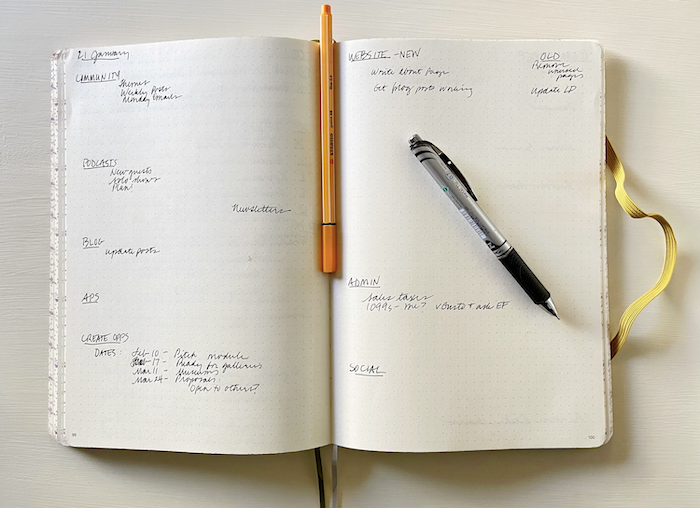
This is where I’ve been for the past couple of weeks—except for the Instagram scrolling. I didn’t have time for that. Chaos. Technology meltdowns. Imminent deadlines with demands for my attention coming from all angles. Extreme irritability. Don’t even come near me!
As we like to say in our Art Biz Connection community, I’ve been so busy working in the business that I haven’t been able to work on the business.
Working in the business is the daily work that you carry out on behalf of your boss (probably yourself). It’s nose-to-the-grindstone. You have blinders on because of this busy-ness, which often means you’re in the muck and can’t see the future and possibilities. Busy work might be absolutely necessary to keep things rolling along, but it is rarely fulfilling.
I recently talked about working in v. working on your business this on an Instagram livestream.
Working on the business means evaluating your busy-ness—taking time to look critically at your next steps, if only briefly.
Instead of staying the course without looking up, you’re acting as the CEO you signed up to be and analyzing, questioning, and strategizing. Is it the right direction? What else is possible? What do you need to address? It’s taking a deep breath and giving yourself enough space to make wiser decisions (and check to see that past decisions are still right for you).
There is a deep sense of satisfaction when working on your business. You aren’t checking boxes and crossing items off of a list, but you are feeling more in control. You begin to see possibilities that weren’t previously evident.
When we’ve been working in the business for too long, we’re in dire need of a reset.
Here’s how you can begin the process of eliminating your current state of overwhelm.
Move The Energy Around
As a first step, move some energy around by trying any of the following.
- Take a walk, do a workout, stretch, or just move your body.
- Tidy up your physical space by decluttering.
- Tidy up your computer desktop, files, or inbox.
- Recycle or throw away whatever is in eyeshot that you don’t need.
- Move the furniture, change your view, or switch out your pillows or throw blanket.
Any of these can forge a path for higher vibrations to enter. Now you’re ready for your brain dump.
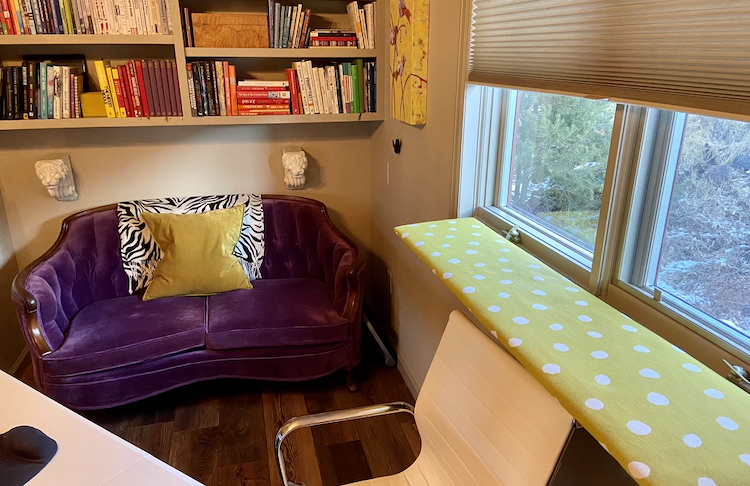
Prepare For Your Brain Dump
If you have more warning than I did … In other words, if you didn’t have a total meltdown and feel the need to cancel everything else on your schedule immediately … You can prepare for your brain dump (Brain dumps rarely make it to my calendar as I tend to need them for immediate relief).
You’re going to need a good hour for the process. When the time comes, close your computer windows, light a candle, play mood music, say a prayer, try EFT tapping, or perform whatever ritual you require in these moments.
You’ll need a couple of pieces of paper or, my preference, a 2-page spread in your journal or notebook.
I like to begin tasks with focused intention and name the task: Now, I am sitting down to get whatever is in my head onto this piece of paper. Sometimes I even say it out loud.
Naming it provides space. You’re not doing anything else at this time. You’re only working on this one thing.
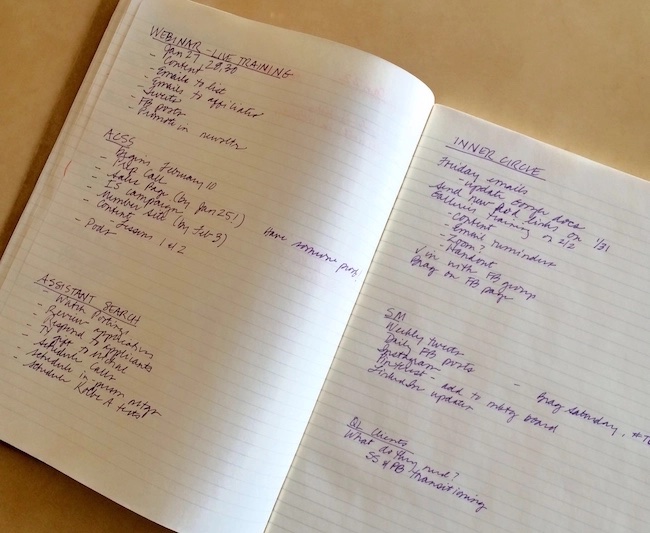
Lay Out Your Projects
In the Artist Planning Sessions, I define a project as a goal that contributes to your vision and takes place in a defined period of time. It consists of multiple steps (tasks) that must be completed in order to be successful.
Your projects might look like any of these.
- Planning an upcoming exhibition
- Developing a new workshop
- Promoting a class or workshop you are teaching
- Ongoing marketing
- Completing a commission
- Writing a grant or residency proposal
- Gaining gallery representation
- Overhauling your website
On your two pages, make headings for specific projects that are on your plate at this moment, leaving plenty of space in between each.
If you find your attention is wandering away from the objective of completing your brain dump, get up and run in place for 1 minute, walk up and down a flight of stairs, or lift your free weights for 10 reps. Physical movement should jolt you into an improved mental state.
You understand, don’t you, that you’re in real trouble if you can’t focus long enough to do a brain dump that will help you focus?
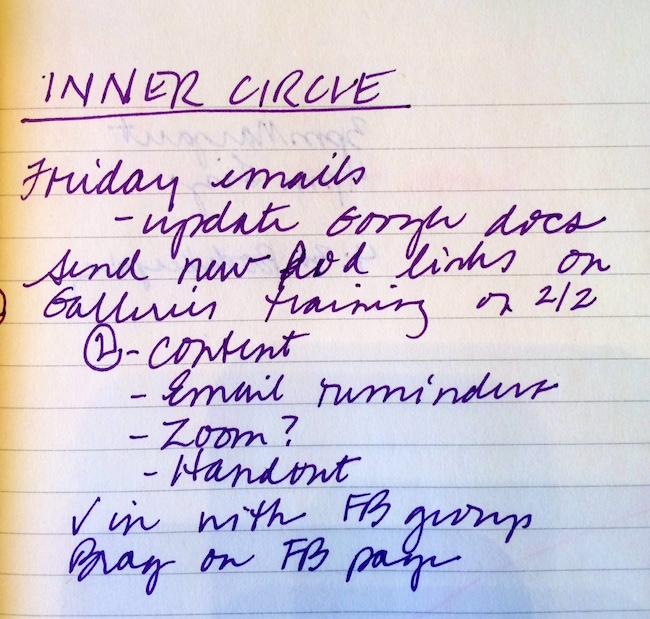
Identify Sub-Projects
Under each heading, make a list of smaller projects that contribute to the success of your bigger project.
For example, if your larger project is ongoing marketing, your sub-projects might include any of the following.
- Posting to Instagram
- Sending monthly emails
- Making 2 videos a month
- Networking
- Giving public talks
There’s no such thing as perfection here. Your mission is to document everything that is in your head right now.
You might also want to prioritize the sub-projects. Which ones must be done first? Either they have to be completed before you can move on to other tasks or the deadline is closest.
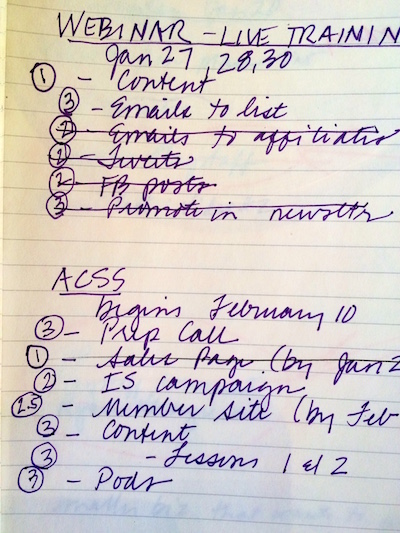
I sometimes label mine with a 1, 2, or 3 (and sometimes add a decimal point if I need to squeeze something in between two digits).
Add Tasks to Your To-Do List
You can use your brain dump paper as a to-do list only briefly. It’s too nutty to use it for more than a couple of days.
From your sub-projects, you should be able to identify related tasks and deadlines. Add these to your master to-do list.
Work The System
Your final step is to maintain this level of control for as long as possible. You have to work the systems you have put in place.
[ How to Increase Your Productivity with Art Business Systems ]
You have to look at your task list, review your projects, work on your business.
As hard as you try to stay in control, the overwhelm is likely to show up again. You’ll recognize it. And then you’ll have a proven process to get back on track.
This post was first published on January 28, 2016. It has been updated with original comments intact.



54 thoughts on “A Proven De-stressing Technique to Eliminate Overwhelm”
This is a fantastic idea! I have had all of the symptoms and needed a brain dump for a long time and now I know where to start! Thank you!!
Terrific. Happy to be of help, Kathleen.
Funny – I just did this today! Its really useful when you feel overwhelmed. Something I said to myself yesterday, when I was feeling overwhelmed, was ‘You can’t do it all, but you can go and paint’ That really helped too. And now I have a painting waiting for my signature!
Woo hoo!
There is something freeing about seeing it all on paper as opposed to floating endlessly through the mind. Paper makes it managable, puts some structure around it…thanks for reminding us of the best way to get the brain hamsters off the treadmill. Headed to make my list right now!
Yes! Liberating! Have fun with it, Cindy.
I have found that using sticky notes instead of writing lists works very well for me. I can do a brain dump and get lots of ideas/tasks down. I can use different colors for different priorities/projects. I can easily move the stickies onto separate sheets, such as “To Do TODAY,” “Long Term Projects,” “Ideas for Future Thought.” As the status of a sticky changes, I just move it to the right place for that day. I can also create project sheets and use stickies to list the steps I need to take. I can then arrange and rearrange and insert stickies as needed without having to rewrite the entire information or drawing arrows all over the place. As I complete items, I just remove the sticky. I either throw them out, or if I’m looking for proof of what I’ve accomplished, I date it and place it on a sheet of other items I’ve completed.
So happy you have a system that works for you, Vicki. All of those sticky notes would drive me bananas, but that’s why we have variety and why no single system works for everyone.
I have done this for years but it is in the form of a handwritten To Do List. I just list everything that I can think of that is on my plate and put a check off box in front of it as I complete something I cross it off the list and get a feeling of accomplishment, At the same time I add new things to the bottom of the list until the page is full. Then I rewrite the list without the completed task and the list grows shorter. I find that the things that I don’t have control over or that I have been procrastinating about rise to the top and stick. I sometimes forget about the list and come back to it months later to find that I have completed everything or that the task were not important after all. it is an interesting exercise and sometimes completely needed to keep my sanity. I will have to start calling it Brain Dump.
Sounds like a good process that works for you, Kevin.
The brain dump is a most productive tool. The key is to remember to keep the project list with you. I write mine, because I love the physicality of pen and paper. I also make a photograph of it into Evernote.
Christine: My ongoing project list is in Asana, so that’s always with me. But sometimes you just have to use paper.
Love the “brain dump” term! I use this process all the time to stay on track. Always start by cleaning my desk area before the creating the list. Tamps down the chaos!! Use this process for studio tasks too. Like the sticky note idea by Vicki, may try that. Thanks for the post Alyson!
Ooooo. Nice addition, Christine. Clean the desk!
Hi aAlyson,
For me it has to be typed into the computer…separate pages for each topic…big fonts…with dates….what ifs?…what nots?
I loose stickies/post its then their order is gone…
And with my writing I’d need a dispensing chemist to read it back to me!
Ha!
Actually yellow and red make green in an additive color scheme such as light. Orange is subtractive as in pigment or is it vice versa?
I’ve been doing this dump-awful word in my view-I call it making a list. The most important is to describe each little step towards that project. and it feels so good to cross each one as one proceeds to do them. Sense of accomplishment even though the whole project is not finished.
I love your website!!
Call it what you like, Colette. List doesn’t describe the process as I think of it. But it matters not! Use what works for you.
I am familiar with the term, but I like that you broke this process down into even more steps. I realize today that in order to get back to painting (we just moved out of state) I actually need to make a list of much smaller, menial tasks in order to get things set up. “Paint” is way to overwhelming!
I love your work!!!
Michelle: What about “Paint 2 hours” ?
This is super useful! Thanks for the step by step instructions. And I love seeing your handwritten examples. As a mom, artist, gallery owner, board member, etc, I am in a near-constant state of mental overwhelm and often find myself in the “I have so much to do I can’t accomplish anything” rut. I am definitely going to add this to my toolkit. Grabbing my pens and paper right now!
Let me know how it goes, Jen.
Great idea Alyson! I get “stuck” most on prioritizing. Ill write your questions down on a 3×5 card and paperclip it to each page I’m working on as I go for quick reference. I recently read and used, “When your stuck in the procrastination mode set a 30 minute timer and just start doing anything. ” and it has busted through that wall of feeling conflicted and paralyzed by it and after the 30 minutes I’m able to move forward with more tasks. Now with your ideas i should manage more efficiently. But I’ll have better aim on what to start with if I ever need the 30 minute timer trick again.
Nice! I like that approach, Eileen.
I use Asana for the overall picture of the projects and tasks that I need to accomplish. Asana works particularly well for those projects and tasks that periodically repeat. I also use paper and a “brain dump” list for all of those other things that need to be done – some can be organized into projects and get put into Asana to be tracked there but other are just a list of things that need to be done. I recently started using bullet journaling for the day to day lists and in my journal I have a page for that long list of things that I want to do “someday”. I am just getting going with this way of organizing my brain dump but am finding it a useful way to see at a glance where I stand on what has to be done today, what has to be done this week and all the other things that I don’t want to forget about, but that just do not need to be done right away.
You and I both love Asana, Terry. And you’re the second person to mention the bullet journal to me this week.
This is way too organized for when I need to brain dump. Some call it journaling. Some call it planning. I literally brain dump all the thoughts in my head. It’s important to write them down instead of typing as it gets you to really have to slow down and step away from electronic devices. Sometimes it will be all personal stuff that is clogging my way. Usually there is art goals in there. But it’s like throwing everything on the table and clearing you head. Then I can go back, re-read it, and see what things I need to prioritize, make lists like you mentioned, or maybe just leave the frustration in the book I write in, take a deep breathe, and move on. Writing by hand on paper is huge part of it. We are so connected to everything in our world through technology. It’s like putting that all in a closet for a little bit and slowing down to focus on ourselves. Sometimes it will end up a short writing. Usually it’s like taking a dump truck filled with chaos and circumstances to give my brain a time out. Then I can get back to business. But I do it slowly so I don’t become overwhelmed right away. Focus on priorities. Funny, I always call it “brain dump” too.
This is true for me, too. My brain dumps include way more than just project-related stuff; personal and dayjob stuff that is often what is getting in the way. After the full dumpety- dump, then I can pull together project notes out of that.
Susie: We all think differently. I am one of those people that wants to find a place for things/ideas.
Because I work at home, when I’m overwhelmed the first thing I do is either go for a short walk or spend a half hour in my garden doing something to clear my head. I agree with keeping the list on paper, it’s less complicated and I think writing it down cements things in my head more than using the computer for the same purpose.
Walks are good! So is gardening. Two of my favorite things, Dorothy.
I probably don’t use brain dumps as often as I should but I do use them more as brainstorming for specific subjects especially when I’m ready to work on a specific project. On the other hand, when I am overwhelmed it usually means I need more sleep.
My brain dumps aren’t always list format though. Sometimes I use Schematic Mind mind mapping.
Ah, yes. Sleep!
Doing brain dumps have been very helpful for me but I find the list of questions to ask about those tasks that never seem to get done even more so. I’ve gotten rid of some lingering things on my To Do list realizing I don’t want or need to do them. And if I do need to do them, I become more motivated.
Glad those questions help, Donna.
I love the name, because it is that built up feeling that needs releasing. I do this process as a long list . It isn’t as analytical as yours. I’ll have to see if it helps to incorporate some of these building blocks.
Do what works for you, Norma Jean.
Been thinking along these lines for years,……this will help me insert this into my daily routine. After running my own art gallery for 5 1/2 years, re-establishing myself as an individual artist is priority #1!
Randall: Daily? You could do this daily?
I so needed this today! I have been juggling a few different clients and submitting info to them all this week has been overwhelming. You’re right, putting pen to paper is most efficient. I slowed down, mentally and physically, and got everything organized and out of my creative brain space. Now the juices can flow again, thank you so much!
Sarena: So happy it helps!
I have often used a mind map to get the thoughts out of my head. This idea of a brain dump would be a great next step – taking the ideas from the mind map and sorting them into an actionable list. List making doesn’t come naturally for me so this would be a focussed way to start working on moving the ideas from my head to paper.
Interesting, Paige. Mind map to list. Hmmm.
Like Patricia C Vener, I like to do a mind-map when I get overwhelmed.
Mindmaps help me see connections between things I thought were unrelated or – the opposite – see that something I thought of as central, is really quite peripheral and unimportant. Using a visual process also helps me sometimes reframe things so that I understand more about their why and rather than just a list of why.
I use an app on my iPad called Ideament which rather handily offers the chance to switch views from mind-map to hierarchical list as well – so I get the best of both worlds 😉
Neat! I’ve never used mindmapping for a brain dump. Maybe I’ll try it. I use “My Thoughts” on my computer.
I have used mind mapping for years as a problem solving technique or for organizing my reading or writing, but I would have never thought of it as brain dumping strategy. Thanks for that idea, Paige. Also, thanks, Cherry, for the information about Ideament. I didn’t know about this app. It sounds really useful especially the going back and forth between formats.
I’m currently using a combination of Priorities, to keep track of *everything* (generally things I want to do that don’t have time value) and Reminders for what needs to be done now or soon or asap. The combination has finally freed me from the multiple bits of paper that I kept moving from the studio to the living room and vice versa- wash, rinse, repeat into infinity. So I really wanted to move away from paper as much as possible.
I guess Reminders is kind of my brain dump or at least the place I jot stuff down so I don’t forget it.
For something with multiple steps like an exhibition, I use Priorities. It’s also where I track juried show deadlines and note what work I might enter. In fact, going through all the pages to review everything is on my To Do list. :0)
Hi Alyson! I loved your honest, and very informative post. I can certainly identify with E V E R Y T H I N G you said! Thanks for all the excellent tips from you and your readers. The idea of the brain dump is a core idea in David Allen’s Getting Things Done (GTD) book, if anyone wants to read more about that. I also use a mind map, and organize my tasks and projects in Things by Cultured Code. I’m not sure there is a perfect system, at least for me!
While I don’t generally plan brain dumps, I tend to do them fairly regularly – hoping to avoid meltdowns. Interestingly, I don’t always do them the same way each time, but rather letting instinct guide me on what tools and timings will be most beneficial. One thing, though that is pretty common is that I share the results with someone who helps me be accountable.
Brain dumps don’t help if they don’t lead to actual measurable and actionable output.
This article is so full of good advice!
Thank you Alyson for showing your vulnerability. I have been feeling great and connected to my projects and also feeling of confidence I have never really felt and a direction to go in. BUT – I have been so tired. Really tired. So – sitting down and preparing for a brain dump made me realize that even though I have a pretty clear goal, I have been going in different directions, wasting my precious energy. And, I want to be alone, just me and my dogs it seems. So – this was timely, because I just thought it was the weather, the lack of sunshine – but I realize it is more than that. Brain dump here I come – thank you!
Oh how wonderful it is to hear this! I’ve done this a few times over the years, always on a large sheet of paper with a cartoon of myself in the center, and lines coming out from me of alllll the things that are stressing me out. Then I address each one and see what (if anything) I can do about it. Very cathartic, and I like the term “brain dump”. Thanks for reminding me I’m overdue for this exercise, Alyson!
Lisa: I love the visual of this!